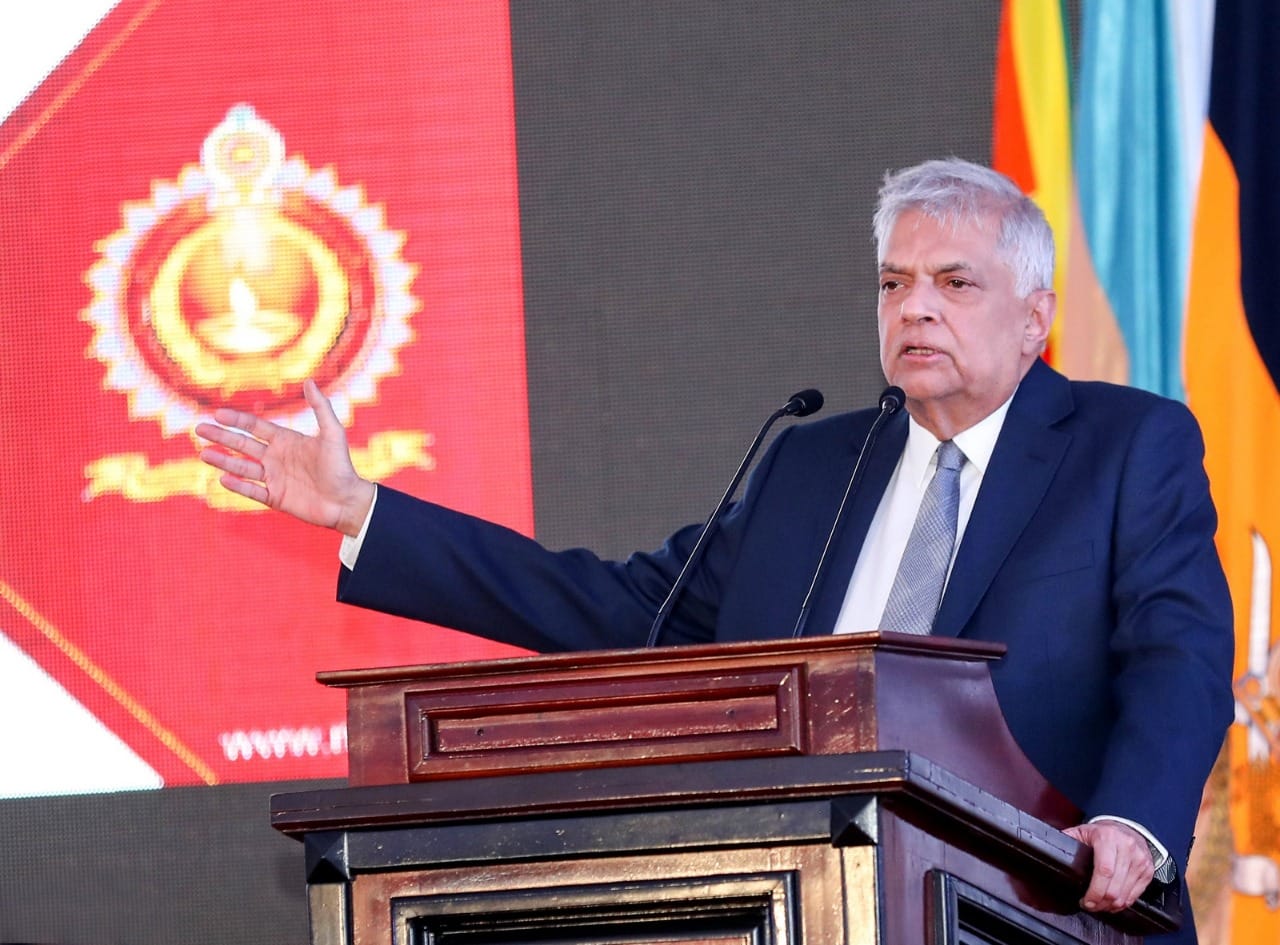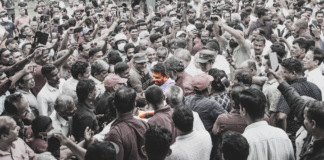In his address to the first batch of graduates of Sri Lanka’s National Defense College here on Wednesday, President Ranil Wickremesinghe made significant points: Firstly, Sri Lanka has unfortunately become a “punching bag” because of Hambantota port although that port is only one of the 17 Chinese ports in this region and is only a commercial port. Secondly, he assured New Delhi that Sri Lanka will not compromise on India’s security interests and will always work together with it to ensure the security of the region.
Fuss Over Hambantota
“The geopolitics of the Indian Ocean has unfortunately made us the punching bag for Hambantota. Actually, there are about 17 ports that are operated by the Chinese in the Indian Ocean. Different companies. There are some more ports that are operated by Dubai World ports. Now, all the ports are commercial ports. So is Hambantota. It is not a military port,” the President stressed.
“If there is security significance, it is in the port of Darwin in Australia where you have, as they say, Chinese ports are operating side by side in the area which the Australian and the US forces use for training. We don’t have that. We don’t allow anyone to come and train here, but we do have our southern command of the navy. We have a divisional headquarters of the army and we have a detachment of the Air Force. They only ensure that this is a commercial port.”
“So though we are a commercial port, it shows our strategic importance that many people come to conclusions which are unwarranted. And I hope the next agreement we come to with China, will not cause such speculation. It is only about debt reduction for Sri Lanka,” Wickremesinghe assured.
Plight of a Small Nation
“First and foremost, in this region, the biggest tension does not come from the sea. It comes from the Himalayas, where, two new nuclear powers, face each other. Secondly, it comes from the Horn of Africa and the Red Sea where bases are being established and militarization is going on. In fact, all those who are militarizing the Horn of Africa, point to us who have not militarized anything, and they say we are the ones who are doing it. So this is the irony of life and the irony of being a small nation.”
“Nevertheless, we do not want the tension in the Pacific to flow over here. It’s not only us. ASEAN doesn’t want it. They don’t want it to come beyond the South China Sea. So, we are with ASEAN on that. We certainly do not want the problems of the Pacific coming into the Indian Ocean.”
“So let us look at how we can maintain our stability. We do this because we want the Indian Ocean to be stable and to be open to all. That’s why we have asked for a code of conduct for the Indian Ocean and freedom of navigation to apply and also the freedom of undersea cables. That is important for commerce to carry on.”
“We have to remember that the bulk of the petroleum supply, energy supply to the world goes through the Indian Ocean. A large amount of shipping goes through the Indian Ocean. We don’t want this to be an area of conflict and area of war. And this is one of the reasons that worry me, because I am in total agreement with the Prime Minister of Singapore and the Deputy Prime Minister who refer to the fact that you can have an unwarranted war.”
“We don’t want that. We want peace and harmony. We don’t want to see big power rivalry in the ocean, because that big power rivalry gets reflected everywhere. We don’t say that the Indian Ocean should be locked out for others. In 1977, we said that the Indian Ocean Peace Zone did not prevent the American fleet from being present there. Subsequently, we have seen the Japanese maritime defense forces here. Certainly, we are not against it. We like to see them here. And then you have seen the People’s Liberation Army, navy here. Its not only here. Many other European navies are now coming here. So these are developments. If the navies want to come, we have no problem. They helped in the anti-piracy operations. But we don’t want a level of rivalry which will affect the security and the peace of our area.”
Will Not Take Sides
“We will not join any big power or take sides, we will stay out of it. And that’s why we want to ensure that the big powers and their rivalry doesn’t lead to conflict in the Indian Ocean. That’s one thing we can’t afford.”
“We are faced with so many problems, non-military problems. Look at the questions today. We are facing a shortage of food, of economic development, of global climate change. Those are more than sufficient for us to focus on. We don’t want our attention taken away by others.”
Security Commitment to India
“When it comes to the security of Sri Lanka, we are of the view that in looking after the security of Sri Lanka we must also ensure that nothing adverse happens to the security of India. That we have been committed to, and we will go ahead with it. There will be no movement out of it. And certainly, our security. That’s why we work with India on the Colombo conclave, on the trilateral security arrangements and many other fields, especially outside the military field of piracy, of human trafficking, of drugs. All those are useful ways in which we cooperate with India and the other island states.”
Relations with Maldives
“Then we also value our friendship with Maldives, those small islands, and we know how important the Maldives is. We all have to ensure that the 8-degree channel and the 9-degree channel are not blocked. One is on the boundary with India, one is within Maldives.”
“What can we do? We can only help to train and strengthen members of the armed forces, as I have asked Secretary Defense and the Chief of Defense staff, that we should, in fact, increase the number of people from Maldives that are being trained here. So this is our policy. And we will operate in this context.”
Defense 2030
“I think we have to now look at the defense and security of Sri Lanka. That’s why we want to have the Defense 2030 report. Firstly, look at the whole region. And that’s a study not only by the Defense Ministry, but by the Foreign Ministry, by the Finance Ministry, looking at the economic and trade side of it. Environment, Climate Change Secretariats also need to get involved.
“Then there’s a question of what our security forces should be like. What are the challenges we are going to face? We are not going to get involved in a war. But what are the challenges we face and what are we going to do about them? That we have to decide because now we have to move out of the phase we were in.”
“Now we have to bring peace, which we are doing. And there will be a final settlement, I hope, in the next few months with the Northern Tamil people. I’ve been talking with the Tamil parliamentarians. We have to think about the future.”
“Even terrorism today, is not the terrorism we faced earlier. It’s of a different nature. I hope we won’t have it. But we must take all precautions against it. The other thing is that other terrorists can use Sri Lanka to attack third parties. Now that that danger is there.”
“Then you look at new warfare. I was reading the Integrated Defense Review UK, which Minister Ben Wallace introduced last year in parliament. It was very interesting, the second chapter. They had what is called a “future battlefield”. Now that is for UK. What is the future battlefield for us? What is our role in that battlefield? What are we going to do? How are we going to restructure the armed forces? What about the cyberspace? Are the existing armed forces going to do it or are you going to have a separate force?”
“So there are so many issues. Even space, as we know, has become a scene of conflict. So what is our role and what are the armed forces and what we are going to do that is within our budgets? This also means we will have a very high expenditure on defense. But we have to gradually reduce it as a percentage of the GDP.”
“We by ourselves can’t do so. We have to talk with other countries which have a similar view. So this is what our future would be. And I will ask Secretary Defense and some of the others to look at the groundwork for Defense 2030. And many of you in the armed forces and outside could make your contribution, because this is really the future of our country. If you don’t have a good defense system, your future is gone. The world situation and geopolitics will get worse. It won’t get better. So let us get ready. There are so many conflicting power plays between China and the West, between Asia and the West.”
“This defense college then is producing the human resources which would play a leading role in looking at our defense structure. And I would ask all of you to put on your thinking caps and make a contribution.”
END






